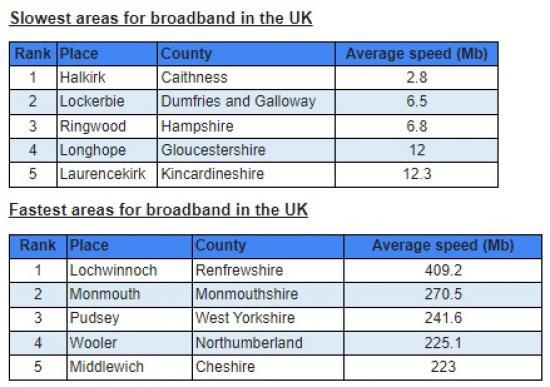Halkirk In Caithness Acknowledged To Have Slowest Broadband In The UK
28th September 2023

The village of Halkirk in the Scottish Highlands has been named the UK's slowest broadband area, with residents receiving average speeds of just 2.8Mb. This is even slower than outdated 3G mobile data speed, and not enough to watch Netflix reliably. UK regulator Ofcom says 10Mb is the minimum "decent" speed homes and businesses should receive, enabling multiple users to browse the internet and use streaming services.
Meanwhile, on the other side of Scotland, Lochwinnoch in Renfrewshire enjoys the fastest broadband speeds in the UK, with an impressive average of 409Mb per household.
Historic Canterbury has won the wooden spoon for the city with the most sluggish internet in the first annual Broadband Genie Speed Index.
Analysis of more than 250,000 speed tests saw the quiet Highlands village of Halkirk named the slowest part of the UK, recording an average speed of just 2.8Mb.
Scotland is also home to the fastest area for broadband, with residents in Lochwinnoch in Renfrewshire enjoying average speeds of 409Mb.
Belfast is the UK's zippiest capital with typical speeds of 152Mb, over 50% faster than Edinburgh, London and Cardiff[1]
A total of 32 cities fall below the 69.4Mb average speed for the UK as a whole.
To fight back against dawdling broadband, Broadband Genie urges households to check their internet and complain if it falls short of the guaranteed speeds for their address.
As well as being a backmarker on broadband, Canterbury is one of the UK's least affordable cities, with the average property costing £368,535, around nine times the typical local income[3][8]. Fellow property hotspots Chester and Worcester, which have both seen house prices rise by more than 60% since 2013, are also among the slowest cities for internet speeds[9].
When it comes to UK capitals, Belfast has the broadband bragging rights. Typical download speeds for households in the Northern Irish city are 152Mb - nearly twice those of the Welsh capital, Cardiff (79Mb), 76% faster than London (87Mb) and 58% more than Edinburgh (96Mb)[1].
Despite topping the overall city speed rankings, Belfast is one of the most affordable places to live in the UK, with typical house prices of £158,000, about five times the city's average salary[10]. Derry, Northern Ireland's second-largest city, also combined strong connectivity with relatively low property prices, ranking fourth for urban broadband speeds.
Western Scotland is the UK's fastest broadband region, with average speeds of 110Mb, nearly nine times as fast as its slowest - the 13Mb rates experienced by families living in the Isles of Scilly[1].
The analysis revealed that 32 cities across the UK fall below the 69.4Mb average speed recorded by Ofcom[2]. This could be the result of poor or faulty infrastructure, a lack of awareness from consumers on speeds available in their area, or an unwillingness to pay to upgrade.
Broadband Genie is advising households to use a speed test to check their broadband performance is up to scratch. If it is not delivering the speeds you are paying for, it is time to take action.
Alex Tofts, broadband expert at Broadband Genie, comments: "No broadband customer should accept a sub-par service, least of all in a year when we have seen record price increases in the industry.
"Most of Britain's biggest providers sign up to Ofcom’s Broadband Speeds Code of Practice. This means they have to be clear about the speeds you should expect at your address, including a guaranteed minimum they must keep above.
"Speed tests are a useful tool for regularly monitoring the performance you are receiving. If they are falling short of what has been promised, contact your provider and raise the issue.
"It’s worth bearing in mind that poor broadband speeds can also be influenced by factors outside of your provider’s control, so make sure you check these first. Poor home wiring or a poorly positioned or faulty router could be dragging your Wi-Fi down.
“Residents in the slowest towns and cities may also be suffering unnecessarily, with faster speeds available in their area if they switch. If you are out of contract and looking to upgrade your broadband, do a quick comparison online to see the best deals on offer. You may even end up paying less for a better and faster service."
